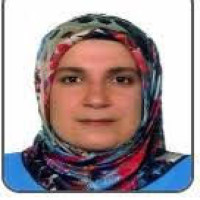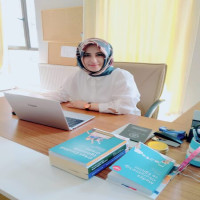Issue Reviewers







Aim & Scope
Harran Education Journal (HEJ) publishes novel, high-impact papers and studies on the field of education research. It was founded by the Faculty of Education, Harran University in 2016. The HEJ is an international, online and peer-reviewed journal which provides open access to researchers and academics studying in the field of Education. Published twice a year (summer and winter), the Journal encourages the submission of manuscripts from around the world, and from the academic fields of Education.
According to the publication policy of Harran Education Journal, quantitative, qualitative and mixed methods related to all fields of education are included in research articles.
Author Guidelines
Author Guidelines
The writing rules applied by the journal and necessary information are given below (The new writing rules will be valid as of the Volume 5 Issue 2. Authors sending manuscripts must follow these rules).
1. The language of publication is Turkish and English. The spelling of Turkish texts should be based on the Spelling Guide published by the Turkish Language Association. http://tdk.gov.tr/tdk/kurumsal/yazim-kilavuzu/
2. The journal has an online publication.That’s why manuscript submissions are made only from the journal's website. Please upload your article to the system after completing the necessary registration procedures thoroughly.
3. The length of a study should be no longer than 9000 words including appendices. Given that the Harran Education Journal is under review for national and international indexing, an extended abstract of 600-1000 words should be written in English for the studies submitted in Turkish while an extended abstract of 600-1000 words should be written in Turkish for the studies submitted in English the accepted manuscripts (e.g.: Introduction, methodology, findings, discussion, and conclusionsections). Once the manuscript is accepted for publication, the final version should be uploaded to the system by the corresponding author according to the template below. The extended abstract in English may also be uploaded while formatting the manuscript according to the template following its acceptance.
Template for studies requiring the ethics committee
Template for studies that do not require the ethics committee
4. The Turkish and English titles of the manuscript must be left-aligned, single-spaced and no longer than 15 words, font face must be Book Antique 14 point. Each word except for the conjunctions must be capitalized.
5. The manuscripts must be in Word format with A4 paper size (top, bottom, left and right 2.5cm space), justified and font face must be Book Antique 12 point with 1.15 spaced.
6. The manuscript and extended English must start in different pages.
a) The Turkish abstract must be between 150-200 words, in the Book Antique font, justified, 10 point, singled-spaced and3-5 keywords.
b) The English abstract must be between 150-200 words, in the Book Antique font, justified, 10 point, singled-spaced and 3-5 keywords.
c) Paragraphs must be indented 1.25 cm. It will be 6 nk before the paragraph and 6 nk after the paragraph.
d) Tables must be in the Book Antiquefont, 10 pointand single-spaced.
e) Table and figure captions be in the Book Antique font, 11 point and left-aligned.
f) Direct quotations including 40 words or more must be indented 1.25 cm from left and right, in the Book Antique font, 11 point, justified, italicized and single-spaced.
Headings
* Level 1 headings must be centered, in the Book Antique font, 12 point and bold. Except for the conjunctions, the first letters of the words will be capitalized.
* Level 2 headings must be left-aligned, in the Book Antique font, 12 point and bold. Except for the conjunctions, the first letters of the words will be capitalized.
*Level 3 headings must be left-aligned, in the Book Antique font, 12 point and italic. Except for the conjunctions, the first letters of the words will be capitalized.
g) The main text of the research studies must consist of introduction, methodology, findings, discussion and conclusion. The methodology section must further comprise sub-sections including participants, data collection tools and data analysis etc.
h) In review studies, the related literature must effectively be analyzed, problem(s) must be presented, and solutions must be suggested.
i) APA (6th) style should be used for references (within or at the end of the text), titles, tables, pictures, diagrams, quotations, citations, and other matters.
j) The tables and figures must not extend the original page size of the journal. If they appear at the end of a page and thus (partly) extend the original size, they must be placed in the subsequent page.
k) References must be justified, in the Book Antique font, 11 point and single-spaced.
7. For the manuscripts accepted for publication, the author(s) must upload the copyright form to ‘additional files’ section during submission in order to indicate that the study has been read and approved by all authors, has not been published or is under review elsewhere, and if published, all publication rights will be reserved by the journal. Moreover, it is a must that a) for studies that do not require the ethics committee, the corresponding author fill out the “Research Ethics Commitment” given below and upload a color-scanned copy of it to the ‘additional files’ section during submission; for studies requiring the ethics committee, the corresponding author directly upload a scanned copy of the ethics committee letter to the ‘additional files’ section during submission.
Click for the Copyright Transfer Form
Click for the Research Ethics Commitment
8. Any legal, legal, economic and ethical responsibility that may arise from the manuscripts sent to the Harran Education Journal belongs to the authors, even if the manuscript in question has been published. The journal does not accept any liability
Submission Checklist During the submission process, authors must check the compliance of their submissions with all the items in the list below, applications that do not comply with this guideline will be sent back to the authors.
a) The submitted manuscript has not been published before and has not been submitted to any journal for review (or a statement has been made in the Notes to the Editor section).
b) The submission file is in one of the following formats: the OpenOffice, Microsoft Word, RT For WordPerfect.
c) The URLs for the references are given, if available.
d) The text has been prepared in accordance with the formal and bibliographic requirements specified in the Author Guidelines in the "About the Journal" section.
e) During the referee review, the principles given in the Blind Review section will be implemented.
Ethical Principles and Publication Policy
Harran Maarif Journal is a journal in which original research produced in the fields of education is evaluated and published in line with scientific and ethical principles. Ethical principles have an important place in the publication policy of our journal. These ethical principles have been prepared on the basis of the guidelines prepared by COPE (Committee on Publication Ethics) and the Higher Education Institutions Scientific Research and Publication Ethics Directive.
ETHICS COMMITTEE APPROVAL
With the decision of ULAKBİM dated February 25, 2020, it has been a prerequisite that“For all scientific branches (including social sciences), ETHICS COMMITTEE APPROVAL must be obtained for studies requiring the ethics committee decision, this approval must be stated and documented in the article”. Therefore, it is essential that the authors who have started the process in 2020 or will start the process in the following years pay attention to this point and upload their ETHICS COMMITTEE APPROVAL as an additional file while uploading their manuscripts to the journal. Likewise, author(s) are required to indicate the information about the ethics committee approval (name of the board, date and issue number) in the method section and the last page of the manuscript.
Research that require the ETHICS COMMITTEE APPROVAL are as follow:
1- All kinds of research conducted with qualitative or quantitative approaches that require data collection from participants using questionnaires, interviews, focus group work, observation, experimentation, and interview techniques,
2- Use of humans (including material / data) for experimental or other scientific purposes,
3- Clinical research on humans,
4- Retrospective studies in accordance with the law on protection of personal data.
Moreover;
1- Stating that "Informed Consent Form" was obtained in case presentations,
2-Obtaining and indicating permission from the owners for the use of scales, surveys and photographs belonging to others,
3-Stating that the copyright regulations are complied with for the intellectual and artisticworks used
For manuscripts lacking the Ethics Committee Approval (whose process was completed or started in 2019 and previous years) the corresponding author must write and sign the following notification in the last page:“For the study titled …, scientific, ethical and quotation rules were followed during the writing process; no falsification has been made on the data collected; I undertake that the Harran Maarif Journal and its Editor has no responsibility in case of all possible ethical violations and all responsibility belongs to the Corresponding Author”.It is essential that the signed form this file also be uploaded to the system as an additional file.
Question: Is the Ethics Committee Approval necessary for all articles?
No. It is only necessary for the articles defined in the criteria for articles requiring the Ethics Committee Approval.
Question: Should retrospective Ethics Committee Approval be obtained for publications produced from studies and thesis completed in previous years?
It should be obtained for submissions which use research data prior to 2020 or are derived from MA/PhD studies. However, the Ethics Committee Approval is not necessary for manuscripts which were submitted to the journal the year before and accepted for publication but has not been published yet.
Ethical responsibilities of editors
• Studies submitted to the journal and deemed appropriate for publication are evaluated regardless of religion, language, race, gender, nationality, seniority or institutional affiliation.
• The editor should pay attention to the protection of personal data in the articles submitted to the journal and should not publish this personal data without the explicit consent of the individuals. The editor should ensure that all information about the manuscript submitted to the journal is kept confidential until it is published.
• The editor should keep correspondence, files and other records related to the articles submitted to the journal electronically or in print.
• The editor should defend the diversity of academic ideas and freedom of scientific thought. At the same time, the journal should continue to operate by observing intellectual property rights and ethical standards.
• In accordance with the publication policy, the editor should prioritize the principle of transparency in all publication processes.
• The editor should ensure that the blind and double peer-review processes are carried out in a healthy manner.
Ethical Responsibilities of Authors
Author(s) who submit a study to the Harran Education Journal are expected to comply with the following ethical responsibilities.
The author(s)’s studies are to be original. Author(s) must accurately and properly cite and/or make references in case they benefit or use other studies
Persons who do not contribute to the content intellectually in the creation of the study should not be specified as authors.
For all the studies submitted for publication, all cases and relationships that may cause conflict of interests (if any) must be stated.
Raw data related to the manuscripts may be asked from author(s) within the review process; in that case, author(s) must be ready to submit the demanded data and information to the editorial board and scientific committee.
The author (s) must have a document showing that they have the rights to use the data used, the necessary permissions for the research/analysis, or the consent of the experimental subjects.
Upon noticing a mistake or fault about studies that have been published, or are in the early view or review stage, the author has an obligation to cooperate with the editor regarding processes including informing the editor or publisher, correcting or withdrawing.
Authors cannot have their studies in the submission process of morethan one journal at the same time. Each application can be started following the completionof the previous application.A study published in another journalcannot be submitted to Harran Education Journal.
Changing the author responsibilities of a study whose evaluation process has started (such as adding an author, changing the order of the author, removing the author) cannot be proposed. Research application permission must be obtained for research to be carried out in schools affiliated to the Ministry of National Education. These permissions must be obtained by the researcher/s by applying through the "Research Application Permits Application and Evaluation Module" at https://arastirmaizinleri.meb.gov.tr/ .
Ethical Rulesfor Referees
• Referees must not share the evaluation processwith third parties.
• Each study submitted to the journal should be subjected to impartialevaluation by the referees.
• Referees must evaluate the work withinthe specified time.
• When the work is found to be plagiarized or previously published elsewhere,the referees must immediately report the situation to the editor.
Ethical Principles on the Use of Artificial Intelligence
Harran Education Journal requires that the use of artificial intelligence (AI) in scientific research be carried out within ethical limits. AI can be used as a supporting tool in processes such as literature review, language control and data analysis, but this use does not in any way eliminate the academic and scientific responsibilities of the researcher. It is necessary to clearly state at what stages and in what way AI is used. The type, function and scope of the AI tool used should be explained in detail in the method section of the study, and the accuracy, scientific validity and ethical compliance of the outputs obtained in this process should be entirely the responsibility of the author.
PlagiarismCheck
In accordance with its publication ethics, Harran Education Journal requires that every study that has passed the "Blind Peer Review Evaluation Process" be checked for plagiarism in order to protect its integrity. In this context, the Turkish and English copies of each study are checked for plagiarism. The financial responsibilities incurred within the scope of the audit belong to the author(s). Depending on the type of article, the similarity index value of the articles is expected to be below 15% (after removing bibliographies and citations).
Plagiarism check is done through Turnitin and iThenticate software. The matches of each studythat are derived from the software are examined in depth, and the matches with the correct reference and citation are sorted out. As a result of the sorting, the remaining matches will be examined, and errors will be detected and reported for the editorial board. The editorial board makes its final decision on the study in the light of the plagiarism audit report of each study. The authors can be requested to correct the errors in the report or the study can be returned to the authors.
Copyright Regulation
The authors publishing their studies in this journal will be considered to have admitted the following conditions:
a) The author gives the copyright of the work and the first publication right to the journal. The work is licensed under the Creative Commons Attribution license, which allows sharing by others, provided that the author is specified and the first publication is made in this journal.
b) The author may make separate contractual arrangements for the distribution of the published version of the work in the journal (for example, to be sent to an institutional database or to be published in a book) without full authorization.
c) Authors are encouraged to share their work on the internet (for example, in the institutional database or on their own websites) before submitting to the journal or while the submission process is in progress; this can yield both more effective opinion exchanges and earlier and more citations (See impact of Open Access).
Publication Policy
The content of the articles to be sent to Harran Education Journal should be prepared in accordance with the principle of equality clearly stated in the Constitution and the Basic Law of National Education, with an approach that supports fundamental human rights and freedoms and rejects all kinds of discrimination. The content should not contain elements that violate the rights and freedoms of individuals. In addition, it must not include statements that include race, color, language, religion, political preference, ethnicity, property or any other discrimination.
Open Access Policy
Adopting the principle that providing scientific research to the public free of charge will increase the global sharing of knowledge, this journal provides instant open access to its content.
Price Policy
Harran Educational Journal does not charge for publication.

